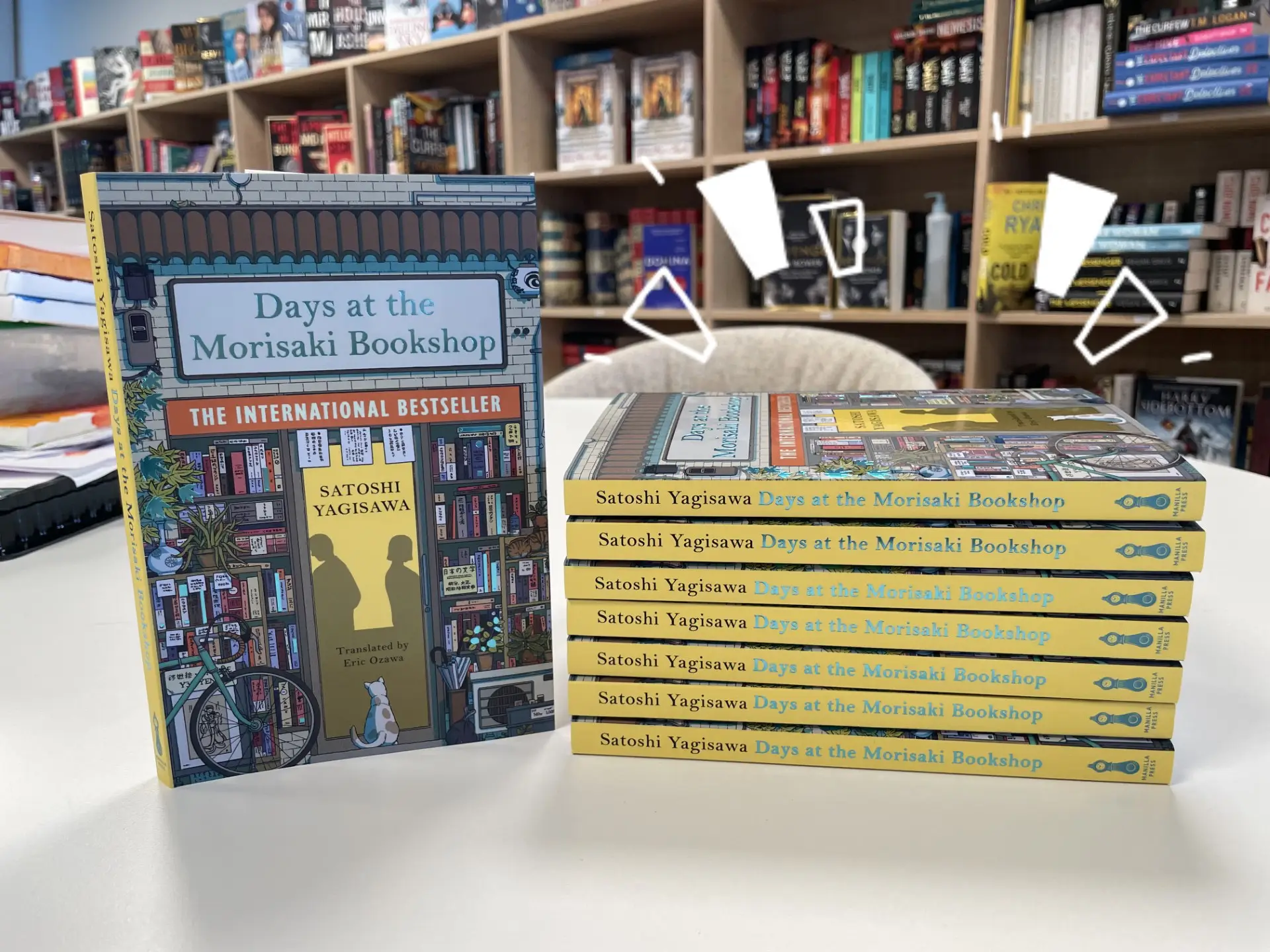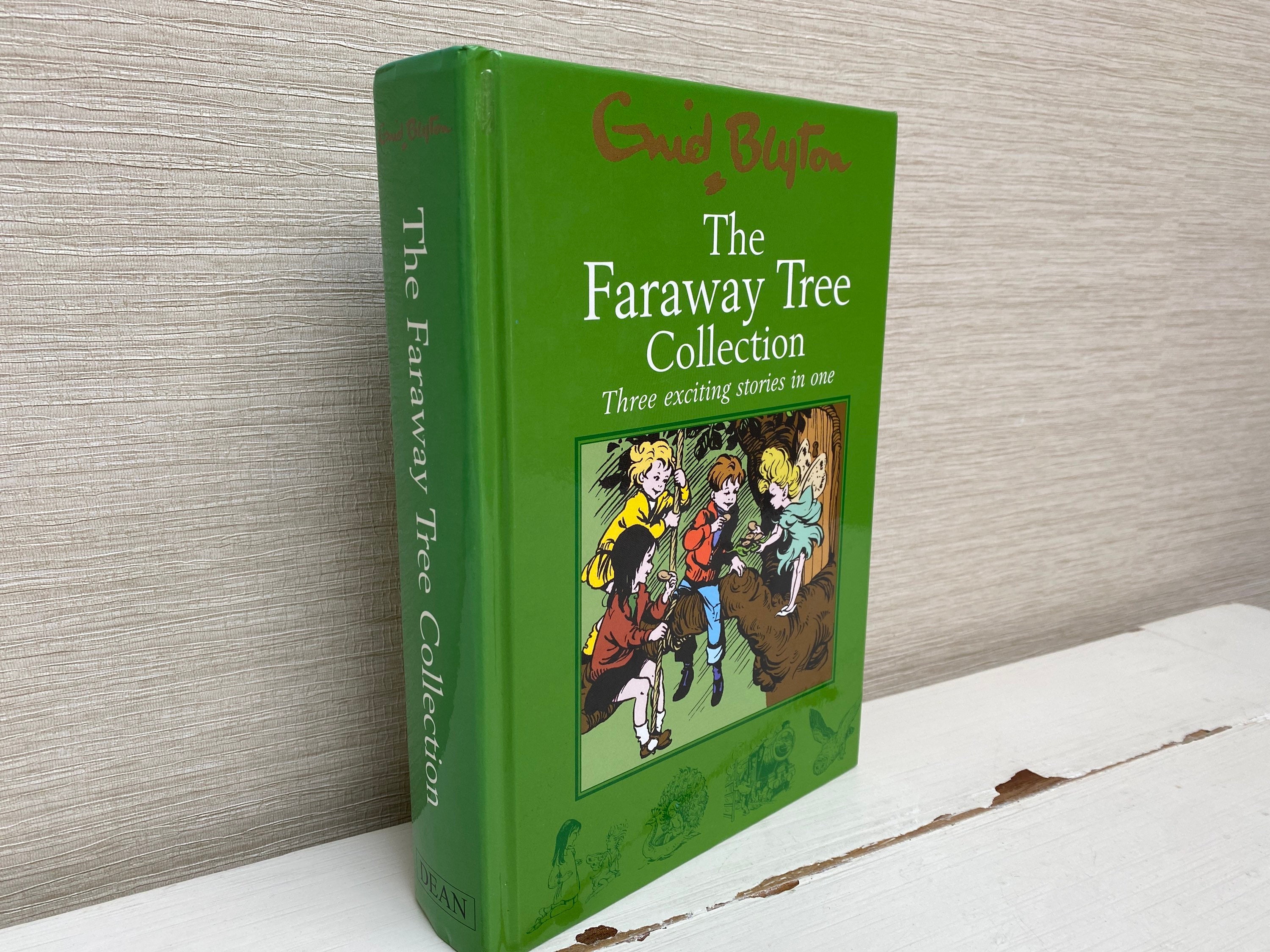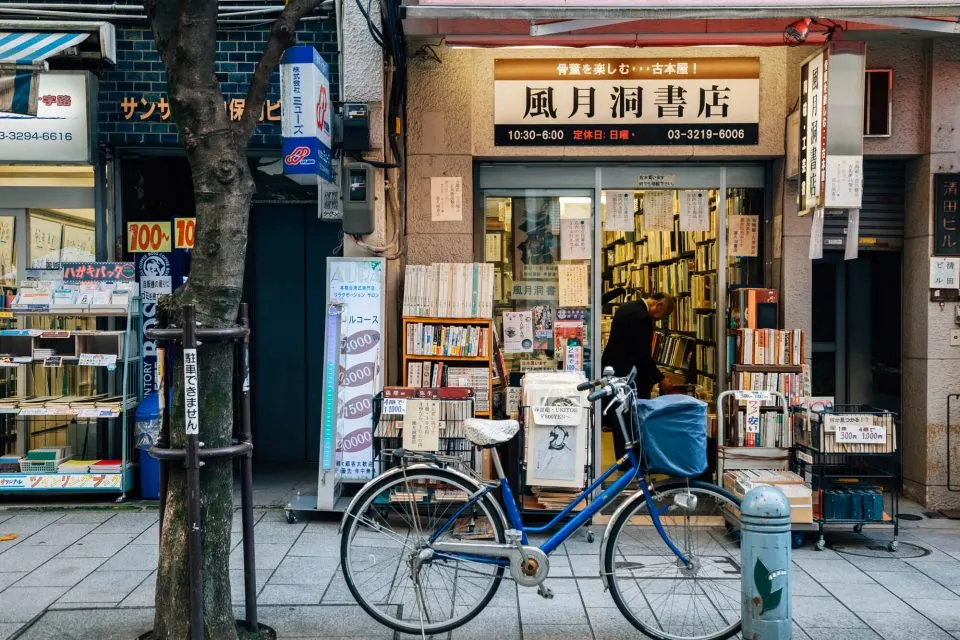Days at the Morisaki Bookshop: Books, Life, Travel and Love
Finding yourself in the most unlikely of likely places

It has been a while since I judged a book by its cover and ended up picking it. But last month when I was at the bookstore browsing through the collections, one book caught my eye. It had the picture of a bookshop on the cover with a cat staring into the glass of the main door.
The act of seeing is no small thing. To see something is to be possessed by it. Sometimes it carries off a part of you, sometimes it’s your whole soul.
The cover looked like a piece of art that could be framed. Having come across and purchased similar art pieces at the same cost, it made sense to just pick up the book as I would also be getting a story to go with the cover art. The story being of time spent in a bookshop and the healing power of books as even more lucrative. Isn't every book readers dream to live in a bookshop? And the fact that it is second hand makes it even more attractive.
That is how I ended up getting Days at the Morisaki Bookshop.
This article contains spoilers for the book. I highly recommend you to read it before proceeding further.
Of Books
When I started reading the book, I discovered Takako's story and her breakup. It made all the more sense for her to find a way out with books. But, when she does end up going to live at her uncle's bookshop, it takes her more time than I expected to take to the books she is surrounded with despite the urgings of her uncle and others.
“Young people today, they don’t read books anymore. They just play computer games. It’s hopeless. And even if they do read books, it’s just manga or these shallow little stories on their cell phones. Even my son, he’s almost thirty and he still just plays video games all the time. Is that okay? You think so? Absolutely not. They’re only seeing the surface of things. And if you don’t want to be a shallow person, then you should try reading some of the wonderful books in this place.”
One night, she does pick up one of the many books in her room, and she finds herself pulled into the world. I mean, who wouldn't? I have always found that a book chooses its reader and when it deems it so, there is no choice but to get lost into the world between the pages.
It was as if, without realizing it, I had opened a door I had never known existed. That’s exactly what it felt like.
As Takako discovers her love for books, she consumes them endlessly. And then there moments where she discovers a connection to the previous readers. Second hand books do have the unique opportunity to build bridges between strangers.
At some point in the past, someone reading this book had felt moved to take a pen and draw a line under these words. It made me happy to think that because I had been moved by that same passage too, I was now connected to that stranger.
I have always been one to keep my books unmarked in my early reading days, but at one point, during a re-read of my favorite fantasy (yes it's Harry Potter), I found myself wishing I remembered what I had experienced the first time around. There were only vague memories of the emotion and the rest was lost with time. I now believe that it is better to mark my books and jot down my thoughts. It is a moment frozen in time, a connection to past me.
Then, there is talk of the first book that got you addicted to reading.
“I think every serious reader at some point in their life encounters a book like that. And they never forget the experience,”
I believe that for me is the Faraway Tree. I remember getting my mom to pick it up for me and then, going on adventures in the ever changing lands at the top of the tree along with Moon-Face, Silky, The Saucepan Man, and the rest. Don't we all have that one experience that we never forget? Perhaps if you don't, all you need to do is look.

Dealing with the breakup
Considering this book did start with a breakup, it had to find a way to be resolved or Takako would forever be stuck in the grips of it. Among the books, both Takako and I forgot about it all until the harsh reality came back to greet us. In the end, it was good to have her uncle to talk to.
I’d wanted someone to ask me about it. I’d wanted someone to console me. I’d wanted someone to take care of me. It amazed me how utterly pathetic I was, but my uncle’s words had wiped out my defenses.
Isn't that the case for us all, when it seems like the end of the world to us, but when we just talk about it, especially to someone close, it becomes much more easy? In that moment, we can detach ourselves from our emotions and truly gauge the magnitude of what's disturbing us. I am grateful to have friends & family, whom I can seek and talk to in such moments.
“It’s not a big deal,” I said to preface the story, and as I told him what happened, I realized that it actually wasn’t a big deal after all. I’d lost my boyfriend and I’d lost my job. That’s it. Midway through the story, it all seemed so insignificant that I couldn’t help but laugh. I fought through it and finished the story, and once I did, I felt a little bit better.
Sometimes, all we need to do is talk it out. And sometimes, we need to go a step further and confront our demons.
But I’d just needed to say what I was feeling, no matter what. Even if someone told me I was being selfish, I had to share what I was thinking. I’d been suffering because I was too weak to do that.
I still needed to vent what I was feeling to him. If not, I couldn’t move on. No matter how much time passed, I’d still be stuck. If my uncle hadn’t given me the chance, I would’ve just been left holding on to these feelings forever.
In expressing our feelings, we would find that we can now move on as Takako did. The key is to not let it consume us by letting it lie in our minds. Our minds have the ability to lose itself in a spiral of What Ifs and Doomsday scenarios, making mountains out of molehills.
Figuring out Life
Another theme I really loved was touching on figuring out life. Uncle Satoru never was satisfied being in one place. He wanted to see the whole would and explore the range of possibilities.
“Yeah, I would work a little here in Japan, save up some money, that kind of thing. Then I’d backpack around. I went to all kinds of places— Thailand, Laos, Vietnam, India, Nepal. I even went across Europe.”
...
“The short version is I wanted to see the whole world for myself. I wanted to see the whole range of possibilities. Your life is yours. It doesn’t belong to anyone else. I wanted to know what it would mean to live life on my own terms.”
Stressing the importance of the search and the scope of it, it all seems so hopeless and yet through it, there is the joy that is found in life.
No matter where you go, or how many books you read, you still know nothing, you haven’t seen anything. And that’s life. We live our lives trying to find our way. It’s like that Santōka Taneda poem, the one that goes, ‘On and on, in and in, and still the blue-green mountains.’ ”
Through his journeys, Uncle Satoru finds his love and finally, when he is forced to return back to his father's bookshop to take over the business, he figures out his true calling.
I had so many aspirations. I flew all over the world only to end up back at the place I’d known every bit of since I was a child. Hilarious, isn’t it? After all that time, I came back here. That’s when I finally realized it wasn’t just a question of where I was. It was about something inside me. No matter where I went, no matter who I was with, if I could be honest with myself, then that was where I belonged.
Perhaps, all of us need to go through our own journeys of search. For some of us, it may bring us back to right where we started from, for others, distant shores await.
Finding Love
Satoshi Yagisawa does not leave us high and dry in this department as he goes on to show the resilience of love. Uncle Satoru does find his love, but it is not a fairy tale ending that we would come to expect. It's is much more real and grounded.
We met in the middle of the journey and we fell in love. But that doesn’t mean we’ll always be traveling together. At some point, everyone has to find their safe harbor. I’d always thought we’d make it to the end together.
Love in the real world is not all roses and petals. It is messy, convoluted and has its fair share of ups and downs. But through it all, even after having lost his love, Uncle Satoru still advised Takako to not to give up on love after her breakup.
“Don’t be afraid to love someone. When you fall in love, I want you to fall in love all the way. Even if it ends in heartache, please don’t live a lonely life without love. I’ve been so worried that because of what happened you’ll give up on falling in love. Love is wonderful. I don’t want you to forget that. Those memories of people you love, they never disappear. They go on warming your heart as long as you live. When you get old like me, you’ll understand.”
In the later part, when Aunt Momoko does return, we learn of what happens. We see her bond with Takako and there is a feeling of a mother daughter relationship between them. Just as her uncle helped her get over the breakup, Takako is able to help him win back his love. True love comes from sticking through the challenges and being there for each other.
On the other hand, there is the hope of new love for Takako as she meets Wada. They hit it off for their mutual love for books, but it again seems all for moot, as Wada was in love with another and he had spent all this time at the café Saveur, waiting for her only to be rebuked by his love.
He’d been waiting all this time— waiting for the beautiful woman he used to bring to the bookshop. He was just like Matsugorō waiting for Ukiyō. Or rather, was that why he transferred all those emotions to the novel and kept reading it over and over?
Takako is heartbroken again by her feelings.
What about the weird way we could talk and talk? Or the way we felt like old friends? None of that was real.
But it is good to see how it all comes together in the end. She had read into the situation, but she had come to find his companionship more worth than her feelings for him.
I realized that in my heart I was genuinely delighted to see him again. It’s true. Seeing him made me incredibly happy. It didn’t matter what he felt about me.
The flame of old love, the hope of new, and the strength of familial love are well represented in the story and I couldn't help but feel the tingle of hope in the air. Where I expected a bit of cheesiness, what I found found was a story of love tastefully done. I can't help but appreciate and marvel at the execution of the story.
Based on Real Places
When I started reading the book, I did not expect to be set in the real world. I was surprised to find that the areas featured are actual places in Japan. I have detailed below of two of the prominent areas featured in the book.
Jimbocho
The Morisaki Bookshop is situated in Jimbocho, which is an actual area in Tokyo, Japan. The district is known as Tokyo's center of used-book stores and publishing houses, and as a popular antique and curio shopping area.
“This neighborhood has the largest concentration of secondhand bookshops in the world.”
“In the world?”
“Yeah. Because back in the Meiji era at the end of the nineteenth century and the beginning of the twentieth, the neighborhood was a center of culture, and it was loved by cultured people and writers. The reason there are so many bookstores is that they built a lot of schools in the neighborhood in that era, which meant there were suddenly all these stores selling scholarly books.”

Being an actual spot you can visit, there are many tourist guides that you can follow to plan a visit to the booktown. Here is one that I found quite interesting:

A prominent festival covered in the book is the Kanda Used Book Festival. This year the festival is happening in Jimbocho right about now and features seemingly endless rows of bookshelves set up in a line along Yasukuni Dori, the main street.
The Kanda Used Book Festival took place over the course of a week in late October. And for that week, carts and bookshelves, crammed with used books, crowded the streets in an open-air flea market.
So, perhaps the ideal time to make a trip to Tokyo would be in October so that you get to experience this festival.
Okutama
In the second part of the book, Aunt Momoko invites Takako along to a girl's trip to Okutama.
“There’s a huge mountain, and on the peak is a historic shrine. The scenery is wonderful, and the air is so pure. It’s amazing. There’s a lovely inn on the mountain, where we can stay and take it easy for a bit.”
After a train ride from Shinjuku Station (the Chūō line from Shinjuku, and changed to the Ōme line at Tachikawa Station), they made their way to the mountains.
We got off the train at a little station called Mitake. The mountains were right in front of us now, with the blue sky behind them, and in the center of it all was an enormous mountain that towered over everything else. It was a majestic, massive mountain— it was not going to budge one bit.
Finally, making their way to the inn, they get to their room and Takako finds herself lost in the view. I could not help but feel her sense of expansiveness, as is the case, when you are faced with raw, beautiful nature.
Outside the window, we were surrounded by dense green foliage. The trees swayed gently in the breeze. Now and then we heard a bird call that might have been a thrush. The mountains in the distance were shrouded in mist. Up above, drifting slowly across the aqua-blue sky, was a group of little, dappled clouds that looked like a school of fish. As I stared at the view, I felt myself losing all sense of time.
I remembered of a time on vacation in Kodaikanal, a local hill station, where the view out of my window was that of rolling hills and clouds in the distance, with my room placed right on the face of one such mountain. It was good to experience this feeling in the words of another.
There were a few other observations that Takako made during her trip that I was able to relate to. One was the fact that many of the shrines and treks of today are much more accessible. But looking back at a time when there was no transportation, the journey itself would have been a challenge.
For hundreds of years, so many had made the same trek to visit this shrine. There was no transportation then, so the walk must’ve taken days or even weeks. It must’ve meant even more to them than it did to us today. I felt humbled by my lack of faith.
And when Takako makes her wishes in prayer, her aunt points out a simple truth.
“A shrine isn’t where you pray for something. It’s a place for you to express gratitude. It’s for you to tell the gods, ‘Thank you for always watching over me.’ ”
Finally, when they make the trek up the mountain, I was happy to admire the view along with them.
The view from the mountaintop was definitely impressive. We were surrounded by green as far as the eye could see. Everywhere you looked there were mountain peaks pressing up against each other. And the sky felt unbelievably close. So endless and clear. If I stared at it too long, I felt like it might swallow me whole. When I squinted, I could just make out the city of Tokyo. It was so small it looked like a little speck in the distance.
This trip in the book kindled memories of my many explorations and further ignited the urge to explore and appreciate the world out there. The fact that someone was able to put it all in words and trigger an emotion of being there was impressive and one that I am sure to chase.
Featured Authors
It goes without saying that a book based at a bookshop is sure to feature it's fair share of recommendations. As with the places, Days at the Morisaki Bookshop name drops a number of authors and it seems that they are very much real. I have sought to compile the list from across the book and you will find them below.
- Ryūnosuke Akutagawa
- Sōseki Natsume
- Ōgai Mori
- Jun’ichirō Tanizaki
- Naoya Shiga
- Saisei Murō (Until the Death of the Girl)
- Kafū Nagai
- Osamu Dazai
- Haruo Satō
- Kōji Uno
- Takehiko Fukunaga
- Kazuo Ozaki
- Naoe Kinoshita (Confessions of a Husband)
- Taruho Inagaki
- Doppo Kunikida (Musashino)
Closing Thoughts
I had to resist adding even more quotes to this article as I found myself learning a lot of simple, important lessons from the book. I loved how grounded the arc of Takako and how much hope it inspired in me. Life is a difficult thing to figure out, but when there are books like this, it makes that search even more enjoyable.
I don’t know, maybe it takes a long time to figure out what you’re truly searching for. Maybe you spend your whole life just to figure out a small part of it.
While the novel showcased the comfort of books, I found that the seed of travel and exploration had been added. The novel embodied Tolkien's famous quote: “The world isn't in your books and maps, it's out there.”
The Morisaki Bookshop stands alone at the corner of a street crowded with used bookstores. It’s tiny and old and really nothing much to look at. There aren’t many customers. And because it has a limited selection, people who aren’t interested in its specialty never give it a second glance.
But there are people who love this store. And as long as they’re devoted to it, then that’s enough. That’s what my uncle Satoru, the shop’s owner, always says with a smile. And I agree. Because I love the bookshop and its owner.
Me too, Takako, me too.
Originally published at 1:24am on 17th, November 2023.
